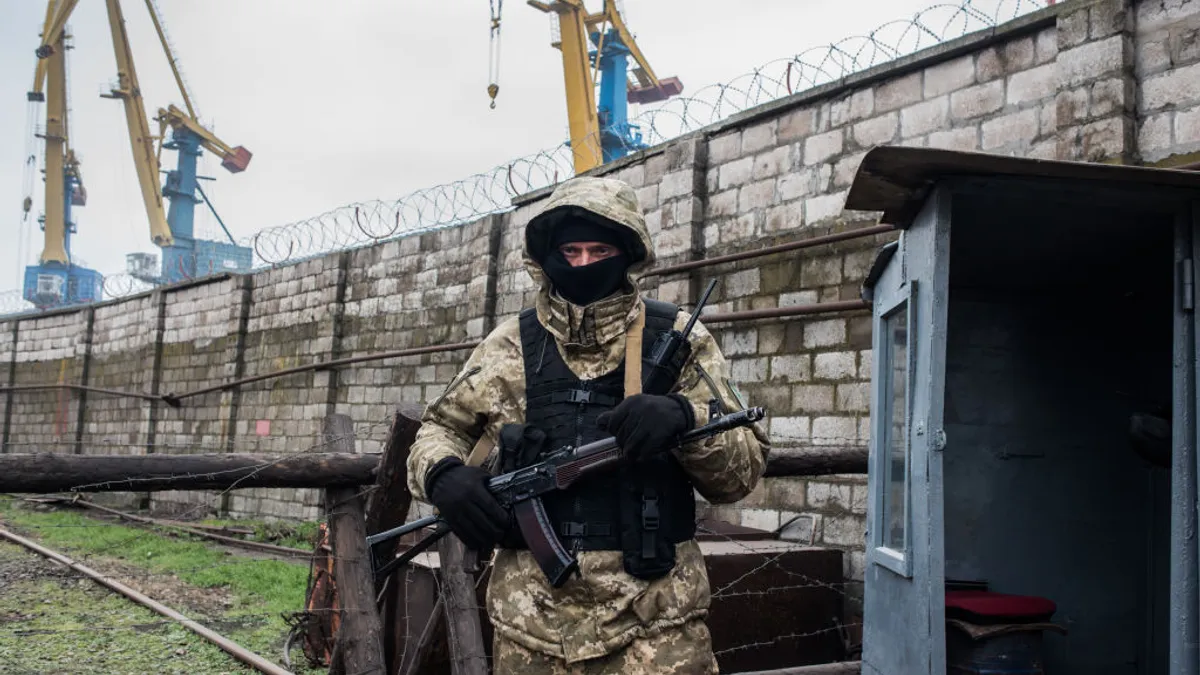Russia's invasion of Ukraine this week threatens to further upend international supply chains still reeling from the protracted COVID-19 pandemic and other disruptions, experts say.
A growing list of companies are halting operations in the region in response to the escalating conflict. A.P. Moller-Maersk will refrain from calling any ports in Ukraine "until further notice," and FedEx and UPS suspended service into and out of the country.
The attack on Ukraine and Western sanctions on Russia could prompt key materials shortages, material cost increases, demand volatility, logistics and capacity constraints, and cybersecurity breaches, according to Gartner analysts Koray Köse and Sam New.
War is a worst-case scenario for supply chains, said Per Hong, a partner in Kearney's strategic operations practice who spent more than six years leading the firm's Russia unit, in an interview Thursday.
By sunset in Ukraine, Russian troops were closing in on the capital, Kyiv. Ukrainians had fled cities, and thousands of Russians protested the decision to go to war. At least 40 Ukrainian soldiers were killed.
— The New York Times (@nytimes) February 24, 2022
Here are some of the day’s major events. https://t.co/jStp4ohjLF
One client told Hong this week he didn't expect his operations to be affected by the Russia-Ukraine conflict. Then, Hong said, the customer discovered that a Tier 2 supplier had outsourced its IT and customer service systems — to Ukraine.
Even for companies without a Tier 1 or Tier 2 supplier connection in Russia or Ukraine, the conflict "really has the potential to create some debilitating disruption across industries from energy to agriculture," Hong said.
Companies can try to navigate the risks by improving their visibility beyond their immediate suppliers and stocking up on key materials. Oil prices, which reached their highest levels since 2014, are expected to continue to rise, as Russia is the world's third largest oil producer and the U.S.'s second-largest foreign oil supplier.
A military conflict carries a risk of "disastrous outcomes" for supply chains, the Gartner analysts wrote. Even a stalemate would exacerbate uncertainty in key industries, including high-tech electronics, semiconductors and rare earth minerals, they wrote.
"We expect severe shortages of hydrocarbon, critical minerals, metals and energy. Prices for those items will likely spike, thanks to both the shortages and behaviors such as irrational buying and protectionism," Köse and New wrote. "This will, in turn, impact manufacturing operations up- and downstream as much as raw material mining."
Diversifying sources and logistics routes where possible, and preparing risk response plans for the most fragile supply chains, are critical for affected companies, the Gartner analysts wrote.
"In the long-term, supply chain leaders must increase resilience by balancing investments in dedicated teams, processes and technologies that will enable their organizations to implement end-to-end risk management," they wrote.
The conflict could have cascading effects on supply chains, such as higher line-haul trucking rates and other transportation costs due to rising oil prices, said Oleg Yanchyk, co-founder and CIO of Sleek Technologies, a procurement software firm that works with shippers and carriers.
The disruption offers companies an opportunity to improve their supply chain systems so they can better predict future issues. "The biggest thing here is supply chain resiliency and flexibility," Yanchyk said.
Some of the outcomes are predictable enough for companies to easily anticipate, said Douglas Kent, executive vice president of strategy and alliances at the Association for Supply Chain Management, in an interview. Others are murkier, especially for companies without adequate visibility.
"That lack of visibility brings forward the unintended consequences, or what we didn't know because we didn't have the visibility," Kent said.
















